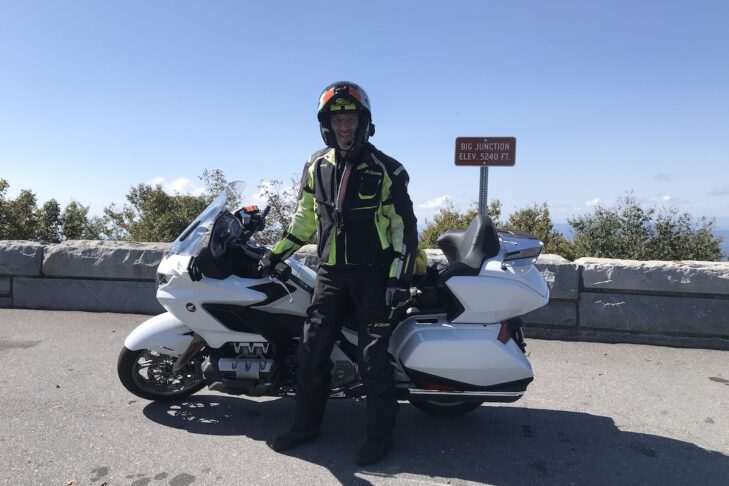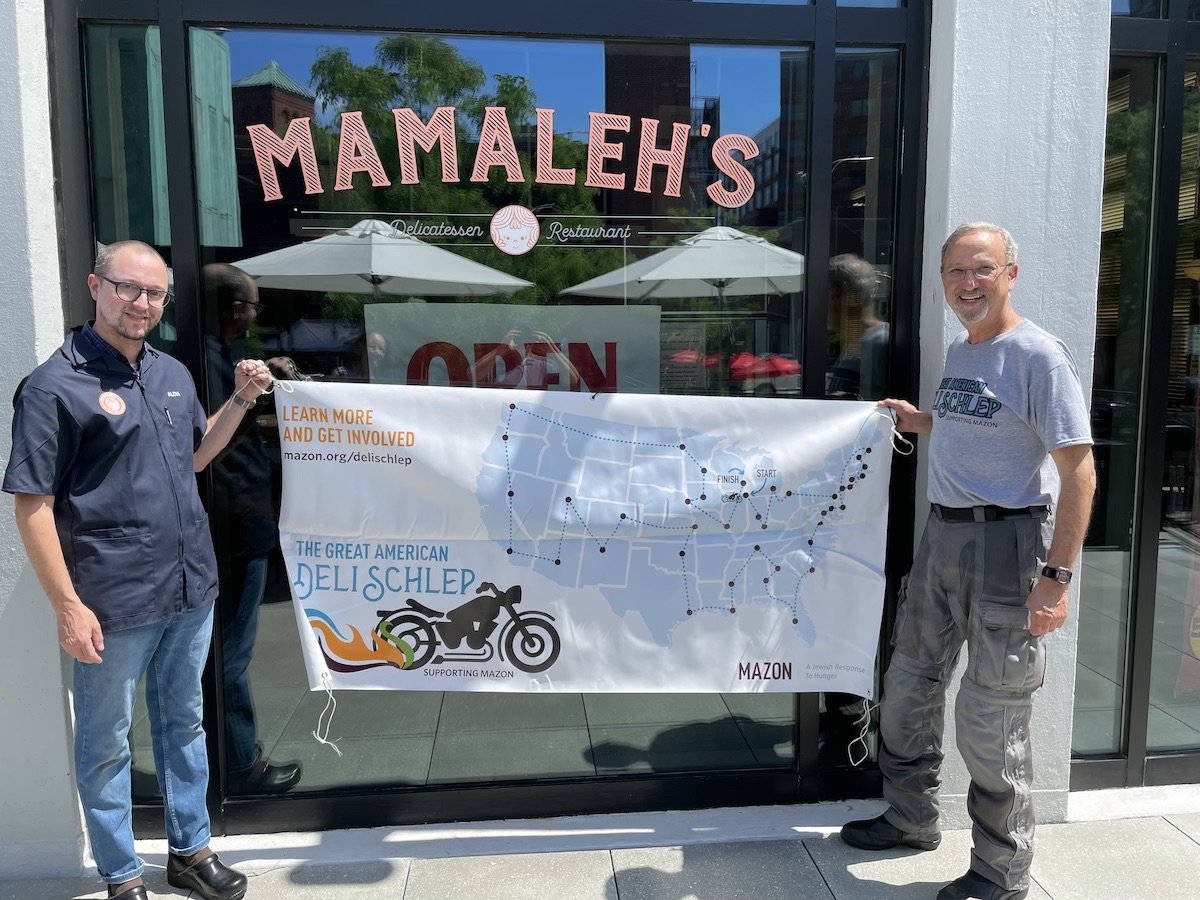Jewish Motorcyclist Rides Cross-Country To Try 42 Delis (JewishBoston)

Steve Goode (Courtesy photo)
Motorcyclist Steve Goode is on a trip many of us would love to take: He’s stopping at Jewish delis across the country as part of “The Great American Deli Schlep.” It’s a 16,000-mile trek, and he’s visiting the best Jewish deli in almost every state as anointed by The Nosher.
This isn’t for mere love of corned beef and lox, though. The Chicago-based biker is partnering with MAZON: A Jewish Response to Hunger to raise awareness and funds for the organization’s fight to end hunger in the United States and Israel through structural policy change.
Across the United States, one in four people currently experiences hunger. Here in Massachusetts, the number is over 1.6 million adults, and more than 13% of kids live in food insecure homes.
Fresh off a visit to Mamaleh’s in Cambridge, Goode paused on the side of the road to chat with JewishBoston.
I’m intrigued by your mission. Why are you embarking on this journey?
I originally saw an article about the top Jewish delis in every state. And, in my prior life, I’d ridden my motorcycle across the country to the national parks—I did all of the lower 48 states. I said, “Wow, it’d be fun to go to a Jewish deli in every state!” And then my wife said, “If you’re going to do that, why don’t you partner with Mazon?” They’re a nonprofit organization that fights hunger in America, so I got them onboard. They’re handling all the behind-the-scenes social networking and fundraising. And I basically handle the writing, the blogging, the picture-taking. I coordinate with my fellow Jewish motorcycle riders in every city. I’m a member of the Jewish Motorcycle Alliance, which is a network of Jewish motorcycle chapters and clubs around the country and the world. There are clubs in Israel, Australia and whatnot. It’s just nice to meet all these other Jewish motorcycle riders around the country. So, you know, I’m blogging and I’m trying to bring awareness to the issue of hunger.
How are you choosing which delis to visit? Walk me through your selection process.
I used the article as my template, figuring that they did the research. I put all the delis into a spreadsheet and started routing it. I’ve changed one or two but basically stuck to the majority of them. One went out of business, but I’m sticking with the 42 delis they had on the list. Then I started plotting dates and times when I could be there and called them, and they were all onboard. They loved it!
Let’s talk turkey: Are you ordering the same thing at every deli?
I’m mixing it up, like lox and bagels, matzo ball soup and turkey pastrami, corned beef—all sorts of different things along the way. I’m not rating the delis. I’m just trying to promote the delis in each city. And because of COVID, a lot of restaurants have gone by the wayside and they’re struggling. This was a win-win situation.

Steve Goode at Mamaleh’s in Cambridge (Courtesy photo)
What are some especially memorable delis you’ve visited so far?
Well, Manny’s in Chicago is my hometown deli. It’s just an old institution from I think the late ‘40s; it’s third-generation. They are the quintessential Jewish deli—in the city, downtown Chicago, you get everybody from mayors to construction workers eating there. Another one is Wagshal’s in Washington, D.C. I was very impressed with them; they have a huge operation. There’s Attman’s, which is 105 years old, in Baltimore. There’s one deli in Cary, North Carolina, that’s a year old, Mookie’s. They’re celebrating their one-year anniversary. Each has a very special story that goes along with it. It’s fascinating. Every one of them is different.
Why is deli culture so appealing?
Well, first of all, I think that it promotes community. People like to come in and talk and sit. There used to be a town-square concept in cities where everybody would come and sit and talk, and the guys would chit-chat and women would talk around the town square. For a lot of these communities, it’s where people get together over a cup of coffee or dinner or breakfast. In the time of fast food, I think people are looking for something a little different.
Are there Jewish delis in every state?
So, [I’m visiting] 42 delis in the lower 48 states. I’m not going to Hawaii, and I’m not going to Alaska. There are some communities between Seattle and Fargo, North Dakota, where there are no delis. That line from Seattle to Fargo is 1,500 miles. There’s nothing in Wyoming or Montana or Idaho. There’s nothing in North Dakota, South Dakota. I don’t think there’s anything in Vermont. There’s nothing in Arkansas. So, there are states that don’t have Jewish delis. And, unfortunately, a lot of them have gone by the wayside, whether it’s because people’s eating habits have changed or generations don’t continue in the restaurant business. There’s got to be a handoff. There’s got to be that 20-something-year-old who says, “I’m gonna take charge now. I want to take it to the next level.”
Favorite deli order?
I happen to like corned beef sandwiches, potato pancakes and matzo ball soup.
Best stretch of road in the country to ride a motorcycle?
The ideal situation for a motorcycle rider, at least for me, is to stay off the interstate highway systems. It’s all trucks and lots of traffic and people, and you just see fast-food joints. But you don’t see America, and so I look for the back roads. I’m going to be going from Atlanta to the Knoxville, Tennessee, area. I’m going to go back roads, through all of these little towns and little roads. You’re going 50 miles an hour, 40 miles an hour. You get to see how the rest of the world lives. What always blows me away is that, as I’m driving down these little roads and I look at these homes, someone lives there. That’s their home. That’s their neighbor. That’s their ‘hood. Maybe it’s a one-stoplight town. For me, it’s a wakeup call. Holy cow! It’s not Highland Park or Chicago. It’s not Boston. It’s not Philly. It’s these little towns. So, to answer your question, the best roads are twisty, curvy, treelined and preferably with a stream running by it.
What does motorcycling have in common with Judaism? Is there a connection?
Your mother always warned you about those guys! Is there a connection? I’ll tell you two really quick stories. I’m in Manchester, New Hampshire, and I’m standing at a deli and taking pictures and talking to the owner. This guy walks in with a sleeveless T-shirt, with his wife, about 50 years old. He’s got a Star of David tattooed on his left arm. Not a little thing; you could see it from a block away. I’m like, “Whoa, OK, I’ve got to talk to this guy!” I mean, I just can’t walk out without asking him about it. So I walked up to him and asked, “Are you Jewish? I see the Star of David; I’m on this Jewish ride.” He said, “No, I’m not Jewish, but my grandmother was Jewish. And this tattoo is in her honor.” At which point his wife points a finger at him and says, “If your grandmother’s Jewish, you’re Jewish!” And the guy looks at me and goes, “OK!” You scratch the surface a little bit, and you can find Jewish people everywhere.
Fast-forward two days and I’m in Brattleboro, Vermont, looking for a hotel. I’m at the Shell station, and this guy pulls in with an RV and a big trailer. We started talking, and he asked if I was there for the motorcycle races. I said, “No, actually, I’m here because I’m doing this Jewish trip around the country to all these delis.” And he’s about 50 years old, and he looks at me starts chanting the haftarah. The guy was tattooed all up and down both arms and his neck. And he starts chanting to me for like 20 seconds. I was dumbstruck. I asked, “Are you Jewish?” He looked at me and goes, “How the hell would I know my haftarah if I wasn’t?” I’m like, “Never in a million years would I have guessed it!” And he and I laughed, and I took a picture of him, and it was just hysterical. You scratch the surface, and the Diaspora is in full bloom!
To donate to The Great American Deli Schlep, visit mazon.org/delischlep.
